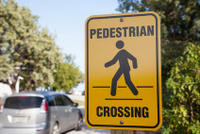 Gary Lewis had a minimum limits auto policy with United Automobile Insurance Company. UAIC notified Lewis that the policy was going to lapse. Lewis took no action and made no payment until July 10, 2007. However that payment was made ten days after he was supposed to have sent payment according to the renewal notice and two days after Lewis hit and seriously injured minor pedestrian Cheyanne Nalder.
Gary Lewis had a minimum limits auto policy with United Automobile Insurance Company. UAIC notified Lewis that the policy was going to lapse. Lewis took no action and made no payment until July 10, 2007. However that payment was made ten days after he was supposed to have sent payment according to the renewal notice and two days after Lewis hit and seriously injured minor pedestrian Cheyanne Nalder.
When Cheyanne Nalder’s father sued Lewis in behalf of his daughter, UAIC did not step forward to defend him. Instead, it denied coverage based on the lapse. Lewis did not defend and Nalder’s father obtained a $3,500,000 default judgment against Lewis.
As is common, the injured Plaintiff obtained an assignment of the policyholder’s rights against UAIC and filed suit in Nalder v. United Auto. Ins. Co., 2:09-cv-1348-RCJ-GWF. In addition to claims of breach of the duty to defend and indemnify, Lewis, Nalder and Cheyanne also sued UAIC for bad faith.
Initially, the U.S. District Court, District of Nevada dismissed the case in its entirety, determining that the renewal notice was not ambiguous and that the policy coverage had lapsed on the date of loss. However, the Ninth Circuit found that there were genuine issues of material fact as to whether the renewal notice was ambiguous and overturned the trial court’s summary judgment.
Upon remand, the parties filed counter-motions for summary judgment. The Court entered its order. Nalder v. United Auto. Ins. Co., 2:09-cv-1348-RCJ-GWF (D. Nev., Oct. 30, 2013. In that order, the court made several important findings.
First, the court found the renewal notice was ambiguous. It interpreted the ambiguity in favor of the policyholder and ordered UAIC to pay plaintiff the $15,000 policy limit. While UAIC breached its duty to defend, the policyholder Lewis suffered no damages because he did not incur attorney’s fees. He had simply allowed a default to be taken against him. See Home Sav. Ass’n v. Aetna Cas. & Sur. Co., 854 P.2d 851, 855 (Nev. 1993) ; Reyburn Lawn & Landscape Designers, Inc. v. Plaster Dev. Co., Inc., 255 P.3d 268, 278 (Nev. 2011)
However, on all of the extra-contractual claims, the court found in favor of UAIC. The court said that the company had a reasonable basis on which to deny coverage. Therefore, UAIC could not have been in bad faith.
If you have questions about extra-contractual liability in Nevada, please contact Mike Mills at Mills & Associates. 702-240-6060×114. He will be glad to respond to your question.
 Follow
Follow Email
Email


